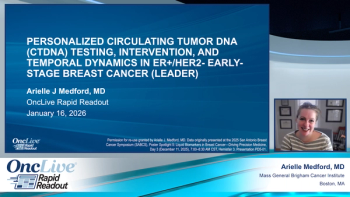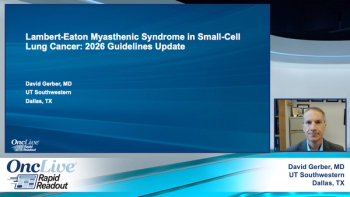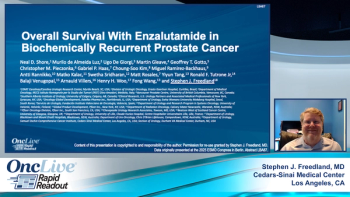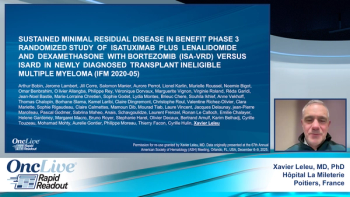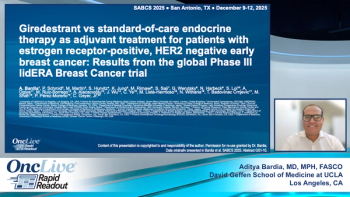
|Videos|July 14, 2021
Rapid Readouts: Personalized versus standard dosimetry approach of selective internal radiation therapy in patients with locally advanced hepatocellular carcinoma (DOSISPHERE-01): a randomized, multicentre, open-label phase 2 trial
Ryan Hickey, MD, presents data from the American Society of Clinical Oncology 2021 Gastrointestinal Cancers Symposium on results of the phase 2 DOSISPHERE-01 trial of personalized vs standard dosimetry approach of selective internal radiation therapy in patients with locally advanced hepatocellular carcinoma.
Advertisement
Ryan Hickey, MD, discusses data from the following presentation: Personalized versus standard dosimetry approach of selective internal radiation therapy in patients with locally advanced hepatocellular carcinoma (DOSISPHERE-01): a randomized, multicentre, open-label phase 2 trial (Garin E, ASCO GI 2021, Interventional Radiologist Perspective)
- The objective of this study is to report outcomes from the randomized, phase 2 DOSISPHERE-01 trial (NCT02582034), which compared standard dosimetry with personalized dosimetry in patients with hepatocellular carcinoma.
- Patients enrolled in the trial were randomly assigned 1:1 to receive standard dosimetry (120 ± 20 Gy targeted to the perfused lobe) or personalized dosimetry (≥205 Gy targeted to the index lesion).
- The primary end point was investigator-assessed objective response rate in the index lesion, according to European Association for the Study of Liver criteria, at 3 months after selective internal radiation therapy.
- The intent-to-treat population included 28 patients in the standard dosimetry arm and 28 in the personalized dosimetry arm.
- Results
- The objective response rate at 3 months was 71% in the personalized dosimetry arm and 36% in the standard dosimetry arm.
- Progression-free survival (PFS) was 6.0 months in the personalized dosimetry arm and 3.4 months in the standard dosimetry arm.
- Median overall survival (OS) was 26.6 months in the personalized dosimetry arm and 10.7 months in the standard dosimetry arm (HR, 0.421; P = .0096).
- The strong response rate but short PFS as well as the prolonged OS suggest that there may be a benefit of combining personalized dosimetry with systemic drugs.
- There was no degradation of the safety profile. Serious treatment-related adverse events were seen in 9% of patients who received personalized dosimetry and 14% of patients who received standard dosimetry. Any adverse events of grade ≥3 affected 60% of patients who received personalized dosimetry and 76% of those who received standard dosimetry.
- Patient selection criteria included good liver function, possibility to spare a sufficient volume of liver from treatment for transarterial radioembolization (TARE) or transarterial chemoembolization (TACE), and 99mTc macroaggregated albumin (MAA) dosimetry used as a screening tool.
- Biomarkers in this study included MAA dosimetry (tumor dose, normal liver dose, portal vein thrombosis (PVT) targeting, for TARE), immunoproofing, and tumor size. Tumors larger than 5 cm have previously been correlated with poor response rates. With personalized dosimetry, larger tumor size did not correlate with lack of response.
Advertisement
Latest CME
Advertisement
Advertisement
Trending on OncLive
1
Long-Term Cilta-Cel Data Show Low Rates of PFS Events in Standard-Risk R/R Myeloma
2
Nonresponse to Bridging Therapy and Peak ALC After Cilta-Cel Are Associated With Neurotoxicity, NRM in Myeloma
3
FDA Underscores Risks Associated With DPD Deficiency and Capecitabine/5-FU Use in Cancer Care
4
FDA Updates Axi-Cel Label to Remove Limitation of Use in R/R PCNSL
5


